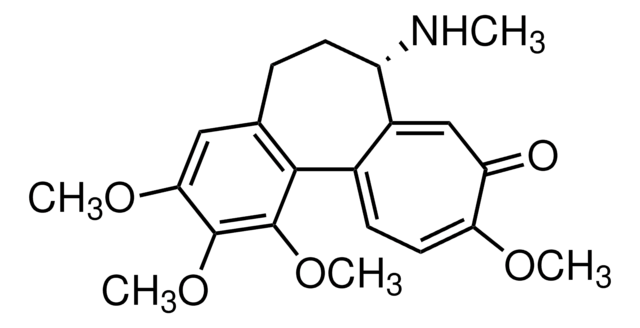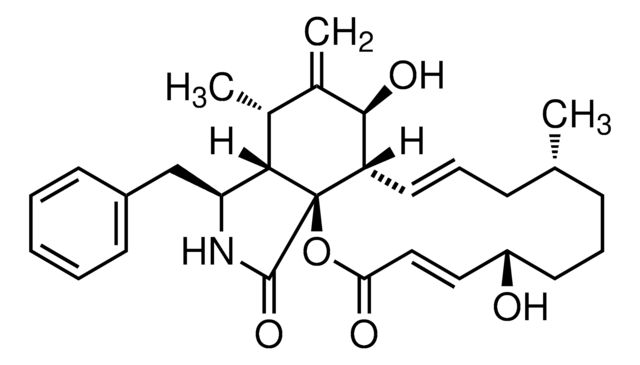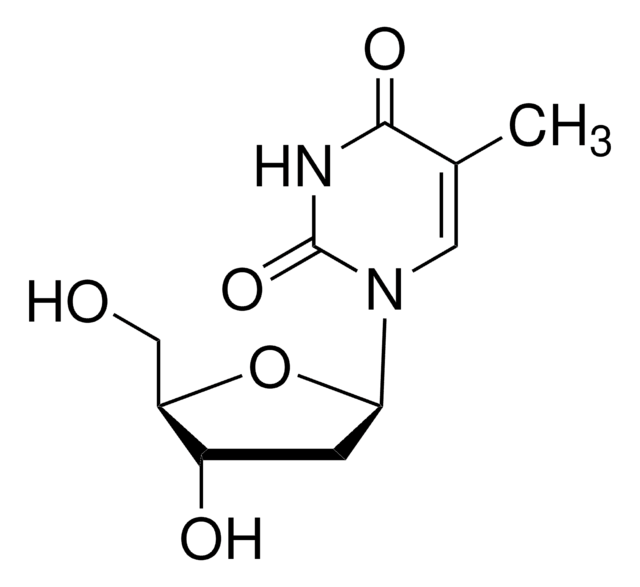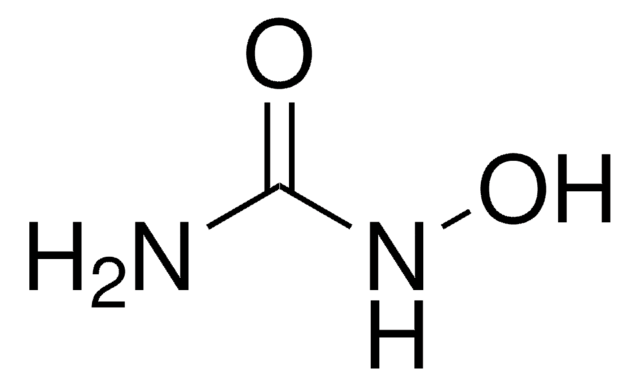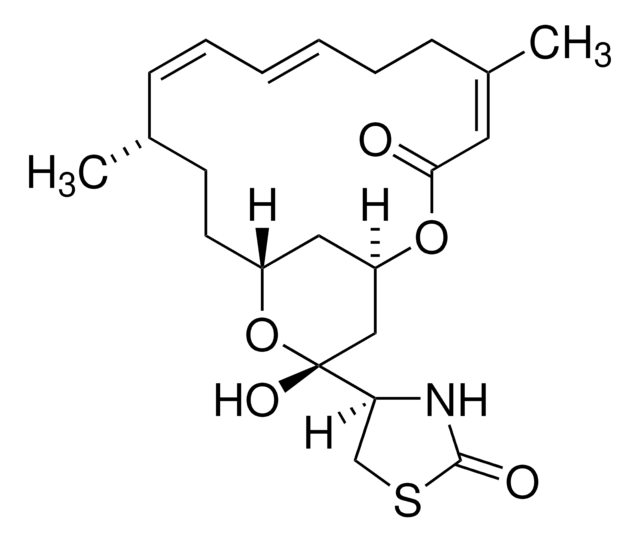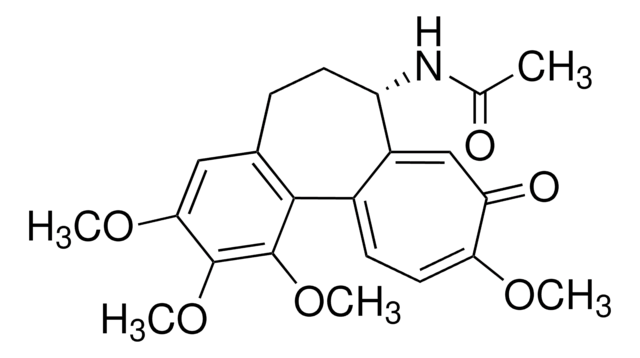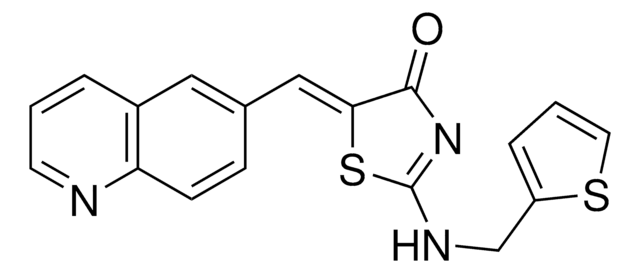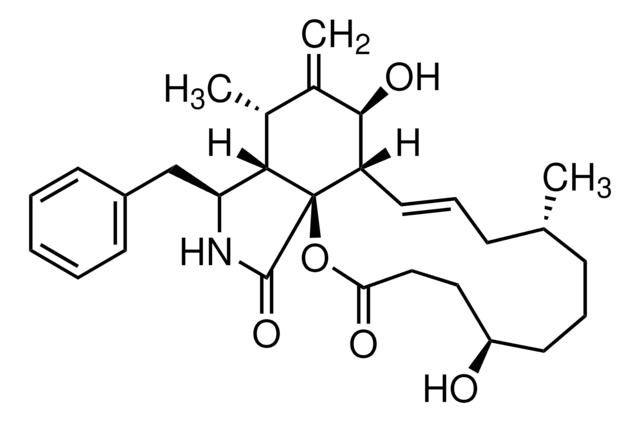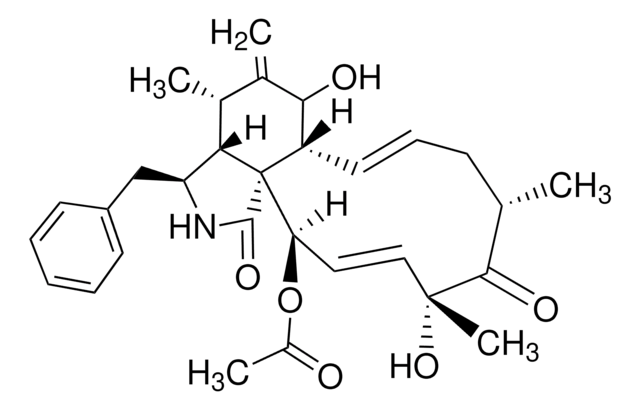SML1665
Nocodazole
≥98% (HPLC), DMSO solution, microtubule inhibitor
Synonym(s):
Methyl N-[6-(thiophene-2-carbonyl)-1H-benzimidazol-2-yl]carbamate, Nocidazole, Nocodazolum, Oncodazole, R 17934
Sign Into View Organizational & Contract Pricing
All Photos(1)
About This Item
Empirical Formula (Hill Notation):
C14H11N3O3S
CAS Number:
Molecular Weight:
301.32
UNSPSC Code:
12352200
NACRES:
NA.77
Recommended Products
Product Name
Nocodazole Ready Made Solution, 5 mg/mL, DMSO solution
biological source
synthetic
Quality Level
form
DMSO solution
concentration
5 mg/mL
shipped in
dry ice
storage temp.
−20°C
InChI
1S/C14H11N3O3S/c1-20-14(19)17-13-15-9-5-4-8(7-10(9)16-13)12(18)11-3-2-6-21-11/h2-7H,1H3,(H2,15,16,17,19)
InChI key
KYRVNWMVYQXFEU-UHFFFAOYSA-N
Biochem/physiol Actions
Nocodazole is an anticancer drug that has been shown to interfere with the structure and function of microtubules in interphase and mitotic cells. Malignant cells may be more susceptible to the antimicrotubular effect of nocodazole than nonmalignant cells. Mammalian cells cultured in vitro can be treated with 0.04-10 μg/mL doses for cell synchronization experiments. Prolonged arrest of cells in mitosis due to nocodazole treatment typically results in cell death by apoptosis. Higher concentrations could not be used because of insolubility. High specificity of action may explain low toxicity to bone marrow cells and lack of neurotoxicity. Nocodazole is thought to bind directly to tubulin causing conformational changes resulting in increased exposure of some sulfhydryl and possibly tyrosine residues. Nocodazole′s apparent synergism with cytosine arabinofuranoside has been demonstrated on L1210 leukemic cells.
Preparation Note
Nocodazole forms precipitates in frozen solution, therefore sonication should be applied after thaw to homogenize the solution. It is recommended to sonicate for 1-3 minutes post thawing to remove precipitates that might appear due to freezing.
For cell culture work, dilute Nocodazole ready-made solution (5 mg/mL DMSO) in the culture media, diluted solution is stable for at least 7 days in biological. Mammalian cells cultured in vitro can be treated with 0.04-10 μg/mL doses.
For cell culture work, dilute Nocodazole ready-made solution (5 mg/mL DMSO) in the culture media, diluted solution is stable for at least 7 days in biological. Mammalian cells cultured in vitro can be treated with 0.04-10 μg/mL doses.
Storage and Stability
The product is stable for 2 years at -20C.
Storage Class Code
10 - Combustible liquids
WGK
WGK 2
Flash Point(F)
188.6 °F - closed cup
Flash Point(C)
87 °C - closed cup
Choose from one of the most recent versions:
Already Own This Product?
Find documentation for the products that you have recently purchased in the Document Library.
Customers Also Viewed
Karin Purshouse et al.
eLife, 11 (2022-12-09)
Extrachromosomal DNA (ecDNA) are frequently observed in human cancers and are responsible for high levels of oncogene expression. In glioblastoma (GBM), ecDNA copy number correlates with poor prognosis. It is hypothesized that their copy number, size, and chromatin accessibility facilitate
Pierre-Olivier Estève et al.
Communications biology, 5(1), 1292-1292 (2022-11-27)
In mammalian cells, SET8 mediated Histone H4 Lys 20 monomethylation (H4K20me1) has been implicated in regulating mitotic condensation, DNA replication, DNA damage response, and gene expression. Here we show SET8, the only known enzyme for H4K20me1 is post-translationally poly ADP-ribosylated
M Parant et al.
Ecotoxicology and environmental safety, 182, 109385-109385 (2019-07-02)
The present study was the first approach conducted under environmental concentrations of Gd-DOTA and Gd-DTPA-BMA to assess cellular impacts of these compounds. Gd-DOTA (Gadoteric acid) is one of the most stable contrast agent, currently used as Dotarem® formulation during Magnetic
Katarina T Miteva et al.
The Journal of cell biology, 218(7), 2232-2246 (2019-05-17)
Endothelial cells selectively release cargo stored in Weibel-Palade bodies (WPBs) to regulate vascular function, but the underlying mechanisms are poorly understood. Here we show that histamine evokes the release of the proinflammatory ligand, P-selectin, while diverting WPBs carrying non-inflammatory cargo
Sara De Vincentiis et al.
The Journal of neuroscience : the official journal of the Society for Neuroscience, 40(26), 4997-5007 (2020-05-24)
Stretch-growth has been defined as a process that extends axons via the application of mechanical forces. In the present article, we used a protocol based on magnetic nanoparticles (NPs) for labeling the entire axon tract of hippocampal neurons, and an
Our team of scientists has experience in all areas of research including Life Science, Material Science, Chemical Synthesis, Chromatography, Analytical and many others.
Contact Technical Service

